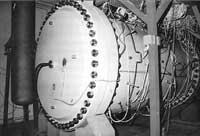Trying to get rid of nuclear waste
It is still a dream to be able to permanently store high-activity radioactive waste in the subsoil. However, the FEBEX programme of the European Union is working on different alternatives. One of them will be treated in the next two years in observing the behavior of the material called bentonite, in the conviction that in the future these residues can be stored surrounded by this substance.
The FEBEX program, created to coordinate the efforts of the different groups working in this area, has a budget of 1.2 billion pesetas. You may think it's a lot, reader, but keep in mind that so far hundreds of millions have been invested in R&D programs.

At present, high-activity waste is stored in the nuclear power plants themselves as a temporary solution and in many cases is subsequently buried. Many times it has been said that the storage system is not completely reliable and hence the polemics that are lit when the words “nuclear cemetery” are heard.
Members of the FEBEX program have searched for suitable places for waste storage and believe that bentonite may be a good choice. Bentonite is an absorbent and discolorant clay that has been traditionally used in the industry. It is considered that due to its characteristics it can maintain the activity of the waste. The project, as mentioned above, will be developed for two years in the CIEMAT entity.
First they will create a barrier structure of bentonite and around 500 detectors. The barrier is heated and hydrated and the detectors will record their behavior exhaustively, finally the barrier is completely cooled and dismantled to analyze the information received. Within the framework of the FEBEX program, in addition, granite drilling will be carried out in the surroundings of the Swiss town of Grimsel for the construction of a deposit of 500 meters deep. Within it, work will continue waiting for the final deposit.





